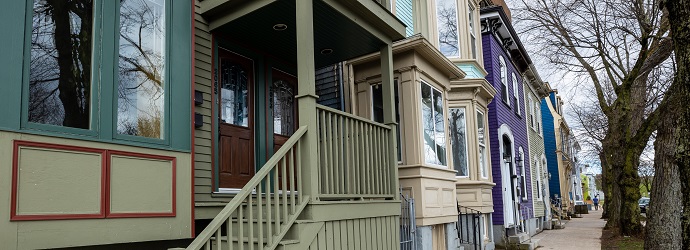
Note: Follow-up to an article first published in the Sep 2021 issue.
In the last issue of Nova Voce, we discussed the challenges facing property owners and developers as well as buyers and tenants with respect to policies implemented by the Nova Scotia Government in response to the Covid-19 pandemic. Since that time, housing prices have continued to escalate quickly, with predications of the average house in Halifax rising by 10 % in 2022, as inventory levels remain low with no expectations of an increase over the next year. In response to the continued impact of the Covid-19 pandemic on the real estate market, the Nova Scotia government has continued their response by implementing both temporary and permanent policies.
This update provides an outline of new and relevant policies recently introduced by the government that are of importance to developers, property owners, and tenants.
Rent Cap Extension
The rent cap currently in place prohibits property owners from increasing residential rental prices any more than two percent annually for existing tenants. At the time of our previous writing, the directive was set to expire when either when Nova Scotia lifted the state of emergency, or until February 1, 2022 – whichever came first. However, the newly elected Provincial Government has subsequently extended the rent cap and it will remain in effect until December 31st of 2023.
Increased Barriers to Eviction
On November 5, 2021 amendments were made to the Residential Tenancies Act (the “RTA”) to permanently protect renters from eviction. The amendments require property owners to, among other things, provide three months’ notice before evicting a tenant for renovations and also provide compensation to tenants whose leases have been terminated for renovation purposes. This compensation requirement varies depending on the situation but could amount to one to three months’ rent as well as moving and additional expenses.
These amendments are a permanent change and as such are important for property owners to understand in order to avoid breaching the RTA and paying significant costs when they need to evict tenants for renovation purposes. The amendments are equally as important for tenants to be aware of in order to properly understand their rights with respect to notice and avoid missing out on potential compensation during an eviction.
Increasing Rents
Another significant change to the new amendments to the RTA is that property owners are no longer tied to the anniversary date for providing an annual notice of a rental increase. With the new amendments, property owners can provide notice of a rental increase at anytime, but they are still limited to doing so to once every 12 months. Previously, property owners had to provide notice of the rental increase four months before the anniversary date of the lease. Property owners still must provide this four months notice but now it is before the effective date of the increase.
Conclusion
The continued upward trend of property values and increased rental prices, alongside the COVID-19 Pandemic has continued to cause both temporary and permanent unprecedented Government intervention in the residential housing sector. The recent policy decisions of the Government and amendments to the RTA have created more change which property owners, developers, and tenants all must be aware of to understand their rights and obligations with respect to the new rules.










